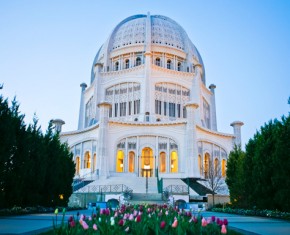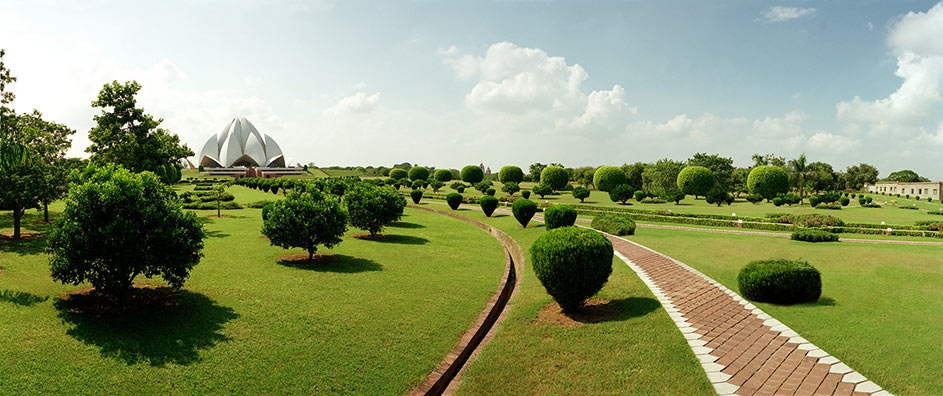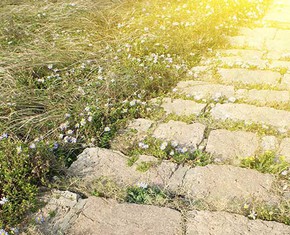The views expressed in our content reflect individual perspectives and do not represent the authoritative views of the Baha'i Faith.
It is daybreak, and from the rising-point of the invisible realms of God, the light of unity is dawning; and streaming and beating down from the hidden world of the Kingdom of oneness there cometh a flood of abounding grace. – Abdu’l-Baha, Selections from the Writings of Abdu’l-Baha, p. 228.
Have you ever prayed at dawn?
I love the feeling of making that spiritual connection as the sun rises in the east to illuminate the earth. I guess the combination of my own inner awakening as I pray, coupled with the quiet dawning of the new day’s light, seems somehow deeply soul-satisfying.
The Baha’i writings include several dawn prayers. I say this one every morning:
I have wakened in Thy shelter, O my God, and it becometh him that seeketh that shelter to abide within the Sanctuary of Thy protection and the Stronghold of Thy defense. Illumine my inner being, O my Lord, with the splendors of the Dayspring of Thy Revelation, even as Thou didst illumine my outer being with the morning light of Thy favor. – Baha’u’llah, Baha’i Prayers, p. 116.

My goal—I guess you could call it my spiritual bucket list—involves experiencing the joy of saying dawn prayers at each of the world’s Baha’i Houses of Worship. Have you ever seen or visited one? Eight Baha’i Houses of Worship now exist, one on each of the Earth’s continents—Africa (in Kampala, Uganda); Asia (in New Delhi, India); Australia (in Sydney); Europe (in Frankfurt, Germany); Central America (in Panama City, Panama), North America (in Wilmette, Illinois) and South America (the Baha’i House of Worship in Chile, currently being built, will open in 2016); and in the Pacific Islands (Apia, Western Samoa).
Each of these beautiful buildings has nine sides and a central dome, symbolizing the unity of all Faiths, the openness of the Baha’i teachings to everyone, and the oneness of God.
The Baha’i writings call the Baha’i Houses of Worship “dawning-places of the praise of God” (or Mashriqu’l-Adhkar in Farsi), which perfectly summarizes their function. Baha’i Houses of Worship aren’t just for Baha’is, and they’re not only intended for worship in the traditional sense of the word, either:
…the original purpose of temples and houses of worship is simply that of unity — places of meeting where various peoples, different races and souls of every capacity may come together in order that love and agreement should be manifest between them. That is why Baha’u’llah has commanded that a place of worship be built for all the religionists of the world; that all religions, races and sects may come together within its universal shelter; that the proclamation of the oneness of mankind shall go forth from its open courts of holiness… – Abdu’l-Baha, The Promulgation of Universal Peace, p. 65.
Baha’is strongly assert that science and religion essentially agree, and in the same way, worship and action also go hand in hand. That’s why every Baha’i House of Worship welcomes everyone no matter what they believe; and exists not only for the worship of God, but for service to humanity. Each Baha’i House of Worship’s long-term plan includes the building and running of a number of charitable institutions designed to provide care, comfort, healing and education to all humanity:
The Mashriqu’l-Adhkar is one of the most vital institutions in the world, and it hath many subsidiary branches. Although it is a House of Worship, it is also connected with a hospital, a drug dispensary, a traveller’s hospice, a school for orphans, and a university for advanced studies. Every Mashriqu’l-Adhkar is connected with these five things… The Temple is not only a place for worship; rather, in every respect is it complete and whole. – Abdu’l-Baha, Selections from the Writings of Abdu’l-Baha, pp. 99-100.
This is new. When we think of places of worship, we normally think of buildings whose sole purpose involves reflection, meditation and prayer. But the Baha’i teachings expand that definition to a much broader and more inclusive scope:
Every country has a hundred thousand gigantic temples, but what results have they yielded? The important point is this — from a temple of worship must go forth not only the spiritual but the material needs…
The doors will be open to all sects — no differentiation; and by God’s help this temple will prove to be to the body of human society what the soul is to the body of man. For when these colleges for the study of higher sciences, the hospital, the orphanage and the hospice are built, its doors will be opened to all nations, races and religions, with no line of demarcation and its charities will be dispensed without regard to race or color. Its gates will be flung wide to mankind; prejudice toward none, love for all. The central building will be dedicated to prayer and worship and thus for the first time religion will become harmonized with science and science will be the handmaid of religion — both showering their spiritual gifts on all humanity. – Abdu’l-Baha, Divine Philosophy, p. 13.
In the Most Holy Book, Baha’u’llah asked the Baha’is to “Build ye houses of worship throughout the lands…” – p. 29. In the future, Baha’is envision a House of Worship and its ancillary charitable institutions at the center of every village, town and city, dedicated to the radiant and joyful worship of God and the altruistic provision of sustenance, shelter and solace to all people:
The wisdom in raising up such buildings is that at a given hour, the people should know it is time to meet, and all should gather together, and, harmoniously attuned one to another, engage in prayer; with the result that out of this coming together, unity and affection shall grow and flourish in the human heart. – Abdu’l-Baha, Selections from the Writings of Abdu’l-Baha, pp. 93-95.
You May Also Like
Comments

















"O people of the world! Build ye houses of worship
throughout the lands in the name ...of Him Who is the
Lord of all religions. Make them as perfect as is possible
in the world of being, and adorn them with that which
befitteth them, not with images and effigies. Then,
with radiance and joy, celebrate therein the praise of
your Lord, the Most Compassionate. Verily, by His
remembrance the eye is cheered and the heart is filled
with light."
(Baha'u'llah, The Most Holy Book, p. 29)